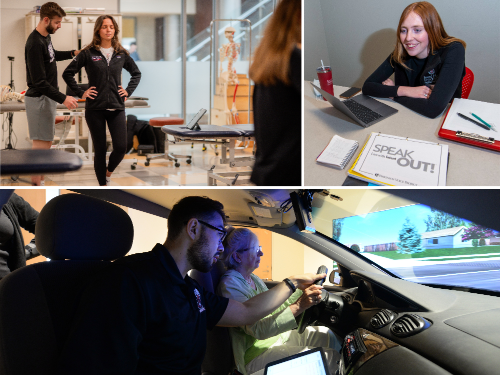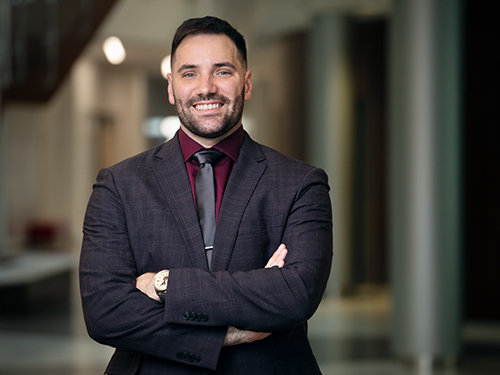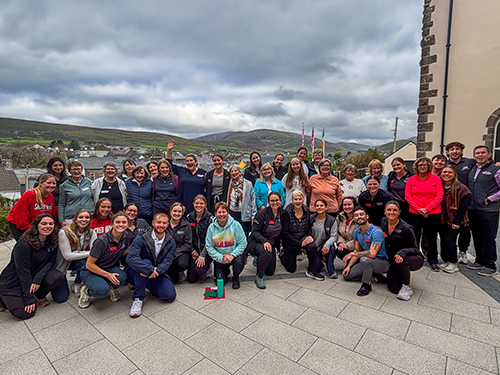
Communication Disorders Online Prerequisite Series
Blizzard: February 24, 2026
Classes before noon on Tuesday, February 24 will remain remote. Review our website for detailed instruction.
Begin Your Journey Take the Next Step
The Communication Disorders Online Prerequisite Series at SHU prepares students who have earned Bachelor’s degrees in other fields to apply for admission to graduate programs in Speech-Language Pathology, at SHU and/or other universities.
Completion of the CMD-OPS does NOT guarantee acceptance into the SHU SLP Master’s program. Students should research the admissions requirements of all the graduate programs to which they are applying. For instance, in the case of SHU's SLP Graduate program:
- No more than 6 credits of Communication Disorders prerequisite courses may be taken prior to applying for the 3-year track.
- No more than one Communication Disorders prerequisite course may be repeated by any applicant (2- or 3-year tracks).
- Students who complete at least 6 of the 8 online courses will be given a preferential application status to our Master of Science SLP program. This status will guarantee them an interview to our program and eligibility for early admission, if they have met all application criteria for admission.
Why enter this program?
To work as a speech-language pathologist, a Master’s degree and clinical certification by ASHA are required. If you are interested in applying for an SLP Master’s degree program, but have a Bachelor’s degree in another field, a series of prerequisite undergraduate courses in Communication Disorders, as well as five courses in the basic sciences, are necessary. The CMD-OPS allows postbaccalaureate students to complete these prerequisite courses online.
How is the program set up?
The CMD-OPS is designed for postbaccalaureate students only; that is, students who have already earned a Bachelor’s degree in an area other than SLP/Communication Disorders. This is not a degree program, but a series of prerequisite courses for application to Master’s degree programs in SLP. Therefore, CMD-OPS students register and enroll at SHU as non-matriculated (non-degree-seeking) students. Because it is not a degree program, CMD-OPS students will not qualify for federal financial aid; however, private sources may be available. Elm Select is a good place to start looking for private loans.
This program is designed for part-time enrollment, with two courses offered per semester over four semesters for a total of eight courses. The most efficient way to complete the series is to start in a summer semester and continue with two classes per term through the following summer (one year of study). This allows for application to SLP Master’s programs in the winter and, if accepted, enrollment in the fall after completing the CMD-OPS.
It is also possible to start the CMD-OPS any semester, take one or both courses offered, and enroll only in the semesters during which you choose to study.
The courses are run through Blackboard, the university's course management system. The courses are asynchronous, meaning you work independently through modules, submitting work on regularly scheduled due dates. You do not have to login on specific days or times. Once you enroll, you will receive a username and password to access Blackboard. Need help? Check out SHU's Blackboard Video Tutorials or contact the PioTech Center.
What courses will I register for each term?
The following undergraduate courses are offered in the CMD-OPS:
Summer Year 1*
Students will be introduced to the acoustic and articulatory properties of the sound systems of human languages. The International Phonetic Alphabet will be presented, and students will learn to record speech in broad phonemic transcription. Variations among regional and cultural US dialects, as well as notation and practice of narrow phonetic transcription will be introduced. The implications of cultural and linguistic differences on speech production will be discussed.
Students will become familiar with the anatomical and physiological bases of human communication and swallowing, including the support structures of the respiratory, articulatory phonatory, and swallowing systems, and the identification and function of muscles in these systems. 3 credits; lab/lecture format.
Fall
This course presents an introduction to the physics and psychology of human speech production and perception. It covers basic acoustics, the glottal sound source, resonance and acoustics of the vocal tracts, acoustic features of vowels, consonants, and suprasegmentals of speech, as well as the physics and biomechanics of phonation, articulation, and resonance and the instruments, applications, and programs used to assess speech production. Principles and models of speech perception, with special emphasis on categorical perception, will also be discussed.
Prerequisite: Take CMD-210 and CMD-300
This course will introduce students to the social, biological, perceptual, and cognitive bases of language. A range of theories of language acquisition will be presented and the impact of nature and nurture on children's development will be discussed. The typical sequence of language acquisition in the areas of phonology, semantics, syntax and pragmatics will be presented. The relations between oral language development and the acquisition of literacy will be emphasized. Dialectical variations in language development and second language learning will be highlighted. 3 credits; lecture/discussion format.
Prerequisite: Take PS-252
This course describes the development and anatomy and physiology of the neurological system that underlies communication and swallowing and is a prerequisite for further study in medical speech, language and swallowing disorders. 3 credits; lab/lecture format.
Prerequisite: Take CMD-300
Spring
This course provides a general introduction to normal and disordered speech, language, and hearing in children and adults. This course considers normal development of communication behavior, the nature of communication disorders, and reviews the various conditions associated with communication disorders. Ethical standards for the practice of Speech-Language Pathology, contemporary professional issues, and information regarding certification, specialty recognition, licensure and professional credentials in Speech-Language Pathology will be presented. 3 credits; lecture format.
Prerequisite: Take CMD-201
This course presents an introduction to the psychophysics of sound, and practice of audiology. It covers the anatomy, physiology and common pathologies of the auditory system, impact of hearing loss, types and characteristics of hearing loss, conventional procedures used to assess hearing, interpretation of audiological test findings, and criteria for initiating audiological referrals. Issues of ethics, professional practice, licensing, and credentials for audiology practice will be reviewed. 3 credits; lab/lecture format.
This course describes the development and anatomy and physiology of the neurological system that underlies communication and swallowing and is a prerequisite for further study in medical speech, language and swallowing disorders. 3 credits; lab/lecture format.
Prerequisite: Take CMD-300
Summer Year 2*
This course will orient students to clinical practicum, including the scope of assessment and intervention across the life span. It will include an overview of goal writing, lesson planning, writing SOAP notes, report writing, progress monitoring, and ethical conduct. Legislative, regulatory, and reimbursement issues that affect the practice of Speech-Language Pathology in educational and medical settings will be presented. As part of this course, students will complete 25 hours of intensive observations in various educational and medical settings.
Prerequisite: Take CMD-200 and CMD-201
Do I qualify?
To be admitted to courses in the CMD-OPS, you must submit (via official or unofficial transcript):
- Proof of a completed Bachelor’s degree from an accredited institution, in any discipline.
- Proof of at least a 3.0 overall GPA in your Bachelor’s degree.
How do I apply?
- Visit the SHU Undergraduate Academic Calendar to find the start date of the course/s you wish to take.
- Submit the Request Information form, and you will be contacted by a member of the program. Following this conversation about your interest and eligibility, you will be directed to the online application.
- In addition to the online application, you must submit unofficial or official undergraduate transcripts via email to enroll@sacredheart.edu or upload to your Applicant Portal.
- Your transcripts will be reviewed and, if approved to register, you will receive instructions for how to enroll.
What is the cost?
Students pay Part-time Undergraduate Tuition.
Visit Tuition & Fees page for more information.
What else do I need to prepare for graduate study in SLP?
In order to qualify for application to Master’s programs in SLP, you must also have completed five, basic science courses (at least 3 credits each course) required by ASHA:
- A course in Biological Sciences (e.g., BI 103, BI 111)
- A course in Physical Sciences (e.g., PY 103, CH 120)
- Statistics (e.g., MA 131)
- Two courses in Social/Behavioral Sciences (e.g., PS 110, PS 252 -required for SHU's graduate program)
You may have already completed these as part of your Bachelor's degree; however, it is possible to take them while you are completing the CMD-OPS. Most SLP graduate programs require that you have completed these courses to be considered for admission. Be sure to check the specific requirements of all graduate programs you are applying for.
Options for these courses are offered online at SHU (look for sections ending in -O):
Biological Science
- BI 103 The Human Body OR BI 111 Concepts in Biology (3 CR)
Statistics
- MA 131 Elementary Statistics
Social Science
- PS 110 Introduction to Psychology
- PS 252 Child Development Psychology (Note: PS 252 is required for the SLP graduate program at SHU).
Physical Science
- PY 103 Physics of Sound was designed for SLP students and is recommended. This course is offered online every fall semester.
- CH 120 Drugs and their implications is frequently offered online.
The Latest in Communication Disorders
View More News-
 AcademicsPublished:Occupational therapy, physical therapy and speech-language pathology are growing, in-demand fields
AcademicsPublished:Occupational therapy, physical therapy and speech-language pathology are growing, in-demand fields -

New Associate College of Health Professions Dean Eyes Clinical, Strategic Partnerships
Faculty & Staff SpotlightPublished:Jordan Schweidenback brings experience in practice, administration and academic leadership to new SHU position -

Health Profession Students Explore Care Systems Worldwide
Academics, Community Outreach, Student Spotlight & OutcomesPublished:On three separate trips to three different countries, SHU students gained life-changing career experience in global health care

